#Welcome to Data Analytics with Python
Explore tagged Tumblr posts
Text
Welcome to Data Analytics with Python
In today's data-driven world, the ability to harness the power of data for insights and decision-making has become essential across industries. Among the various tools and languages available for data analytics, Python stands out as a versatile and powerful option. Whether you're a newcomer to the field or an experienced professional looking to expand your skill set, mastering Data Analytics with Python can significantly enhance your capabilities and career prospects.
Why Python for Data Analytics?
Python has gained immense popularity in the realm of data analytics for several compelling reasons. First and foremost is its simplicity and readability, which makes it accessible even to those with minimal programming experience. The language's syntax is straightforward and easy to understand, allowing analysts to focus more on solving problems and less on deciphering complex code.
Furthermore, Python boasts a rich ecosystem of libraries specifically designed for data manipulation, analysis, and visualization. Libraries like Pandas provide powerful tools for handling structured data, allowing analysts to clean, transform, and merge datasets effortlessly. NumPy, another essential library, enables efficient numerical computing with support for multi-dimensional arrays and mathematical functions.
For visualizing data, Matplotlib and Seaborn offer robust capabilities to create a wide range of plots and charts, from simple histograms to complex heatmaps and interactive visualizations. These libraries not only facilitate clearer communication of insights but also enhance the overall understanding of data patterns and trends.
What You Will Learn
In a comprehensive Data Analytics with Python course, you can expect to cover a broad spectrum of topics designed to equip you with practical skills:
Python Fundamentals: Begin with the basics of Python programming, including variables, data types, control structures, and functions. This foundation is crucial for understanding how to manipulate and analyze data effectively.
Data Manipulation with Pandas: Dive deep into Pandas, the go-to library for data manipulation in Python. Learn how to load data from various sources, clean and preprocess datasets, perform aggregations, and handle missing data seamlessly.
Data Visualization with Matplotlib and Seaborn: Explore different plotting techniques using Matplotlib and Seaborn to create insightful visual representations of data. From simple line plots to complex scatter plots and heatmaps, you'll learn how to choose the right visualization for different types of data.
Statistical Analysis and Hypothesis Testing: Understand essential statistical concepts and techniques for analyzing data distributions, correlations, and conducting hypothesis tests. This knowledge is critical for making data-driven decisions and drawing reliable conclusions from data.
Machine Learning Basics: Gain an introduction to machine learning concepts and algorithms using Python libraries such as Scikit-learn. Explore how to build and evaluate predictive models based on data.
Real-World Applications and Projects: Apply your newfound skills to real-world datasets and projects. This hands-on experience not only reinforces theoretical concepts but also prepares you for practical challenges in data analytics roles.
Who Should Take This Course?
The Data Analytics with Python course is suitable for a wide range of professionals and enthusiasts:
Aspiring Data Analysts: Individuals looking to enter the field of data analytics and build a solid foundation in Python.
Business Analysts: Professionals seeking to enhance their analytical skills and leverage data for strategic decision-making.
Data Scientists: Those interested in expanding their toolkit with Python's powerful libraries and exploring its capabilities for data manipulation and visualization.
Programmers: Developers interested in transitioning into data-centric roles and expanding their expertise beyond traditional software development.
Conclusion
Mastering Data Analytics with Python opens doors to a multitude of opportunities in today's data-driven world. Whether you aim to advance your career, embark on a new path in data science, or simply gain insights from data more effectively, Python provides the tools and flexibility to achieve your goals. With a solid understanding of Python programming, data manipulation, and visualization techniques, you'll be well-equipped to tackle complex analytical challenges and contribute meaningfully to any organization.
Ready to dive into the world of Data Analytics with Python? Enroll in our course today and start your journey towards becoming a proficient data analyst with Python skills that are in high demand across industries.
Welcome aboard, and let's unlock the power of data together with Python!
0 notes
Text

Hey! and welcome back!
As Uni is about to begin in a few days....I upgraded to a third monitor! Also!! I job a Data entry job! Big things moving forward :)
Let me introduce myself;
I'm Mick, (she/her) and I currently study Data Analytics. I'll be 26 in July and I love to read and play video games in my free time. I also like to watch football (LIVERPOOL xx)
Im currently taking the time to learn Excel and Python. However, I know for school I'll be learning Python, SQL and maybe some other things.
FOLLOW me along on this journey and if you have any questions please ask!
#codeblr#python#coding#data analytics#study blog#study motivation#studyblr#student life#excel#student#physics#maths#pc setup#data analysis#data entry work#data entry projects#data scientist#study aesthetic
28 notes
·
View notes
Text
Exploring Data Science Tools: My Adventures with Python, R, and More
Welcome to my data science journey! In this blog post, I'm excited to take you on a captivating adventure through the world of data science tools. We'll explore the significance of choosing the right tools and how they've shaped my path in this thrilling field.
Choosing the right tools in data science is akin to a chef selecting the finest ingredients for a culinary masterpiece. Each tool has its unique flavor and purpose, and understanding their nuances is key to becoming a proficient data scientist.
I. The Quest for the Right Tool
My journey began with confusion and curiosity. The world of data science tools was vast and intimidating. I questioned which programming language would be my trusted companion on this expedition. The importance of selecting the right tool soon became evident.
I embarked on a research quest, delving deep into the features and capabilities of various tools. Python and R emerged as the frontrunners, each with its strengths and applications. These two contenders became the focus of my data science adventures.
II. Python: The Swiss Army Knife of Data Science
Python, often hailed as the Swiss Army Knife of data science, stood out for its versatility and widespread popularity. Its extensive library ecosystem, including NumPy for numerical computing, pandas for data manipulation, and Matplotlib for data visualization, made it a compelling choice.
My first experiences with Python were both thrilling and challenging. I dove into coding, faced syntax errors, and wrestled with data structures. But with each obstacle, I discovered new capabilities and expanded my skill set.
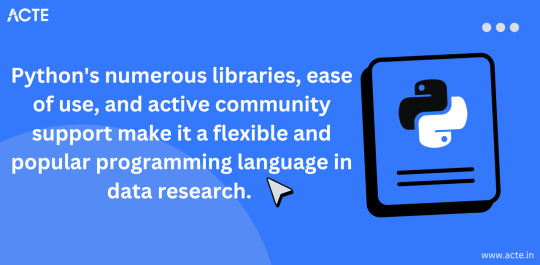
III. R: The Statistical Powerhouse
In the world of statistics, R shines as a powerhouse. Its statistical packages like dplyr for data manipulation and ggplot2 for data visualization are renowned for their efficacy. As I ventured into R, I found myself immersed in a world of statistical analysis and data exploration.
My journey with R included memorable encounters with data sets, where I unearthed hidden insights and crafted beautiful visualizations. The statistical prowess of R truly left an indelible mark on my data science adventure.
IV. Beyond Python and R: Exploring Specialized Tools
While Python and R were my primary companions, I couldn't resist exploring specialized tools and programming languages that catered to specific niches in data science. These tools offered unique features and advantages that added depth to my skill set.
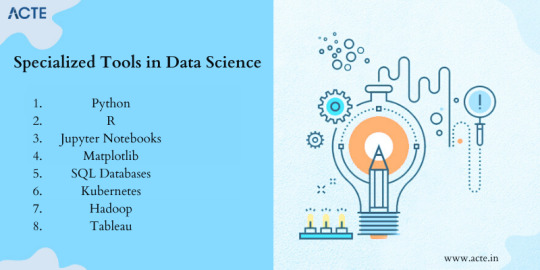
For instance, tools like SQL allowed me to delve into database management and querying, while Scala opened doors to big data analytics. Each tool found its place in my toolkit, serving as a valuable asset in different scenarios.
V. The Learning Curve: Challenges and Rewards
The path I took wasn't without its share of difficulties. Learning Python, R, and specialized tools presented a steep learning curve. Debugging code, grasping complex algorithms, and troubleshooting errors were all part of the process.
However, these challenges brought about incredible rewards. With persistence and dedication, I overcame obstacles, gained a profound understanding of data science, and felt a growing sense of achievement and empowerment.
VI. Leveraging Python and R Together
One of the most exciting revelations in my journey was discovering the synergy between Python and R. These two languages, once considered competitors, complemented each other beautifully.
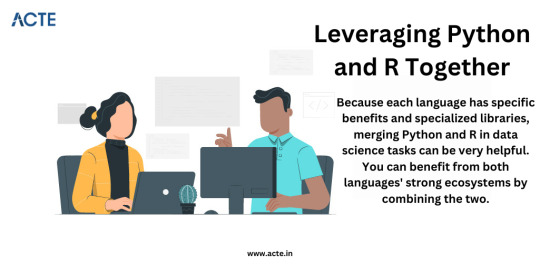
I began integrating Python and R seamlessly into my data science workflow. Python's data manipulation capabilities combined with R's statistical prowess proved to be a winning combination. Together, they enabled me to tackle diverse data science tasks effectively.
VII. Tips for Beginners
For fellow data science enthusiasts beginning their own journeys, I offer some valuable tips:
Embrace curiosity and stay open to learning.
Work on practical projects while engaging in frequent coding practice.
Explore data science courses and resources to enhance your skills.
Seek guidance from mentors and engage with the data science community.
Remember that the journey is continuous—there's always more to learn and discover.
My adventures with Python, R, and various data science tools have been transformative. I've learned that choosing the right tool for the job is crucial, but versatility and adaptability are equally important traits for a data scientist.
As I summarize my expedition, I emphasize the significance of selecting tools that align with your project requirements and objectives. Each tool has a unique role to play, and mastering them unlocks endless possibilities in the world of data science.
I encourage you to embark on your own tool exploration journey in data science. Embrace the challenges, relish the rewards, and remember that the adventure is ongoing. May your path in data science be as exhilarating and fulfilling as mine has been.
Happy data exploring!
22 notes
·
View notes
Text
introduction:)

about me
Helloo~ 👋🏽

I'm Raeshelle! She/Her, 25
I'm not new to studyblr, langblr, or codeblr, but I decided to make this new account to follow my new journey in all things tech and language. My main point in making this is to track my progress in college, share my study related content and to keep up both accountability and motivation for myself.
I'm studying data science and data analytics in college with hopes of working in artificial intelligence and machine learning in the future. I already have a background of being a full stack web developer and a bit of game design so I'm already familiar with a lot of the basic coding concepts.
Aside from tech, I love gaming, learning languages (currently learning Korean!), binging kdramas, fiction writing and so much more.
I'm excited to meet anyone else who's on a similar path!
what will I post about?

my learning journey - any topics that were difficult for me, general info about what I'm learning (Python, sql, statistics, etc)
tips for improving Korean
probably some kpop/kdrama content
reblogs about coding, korean, studying in general
goals

keep up a consistent study habit!
build some cool portfolio projects!
make helpful youtube videos!
minimizing my perfectionism!
I would love to interact with anyone that
is also studying computer science in any discipline, though other data nerds are very welcome
is learning korean, japanese, mandarin, cantonese, tagolog
loves kdrama or kpop
is nuerodivergent in some way
is also a minority in their field
is a fellow cajun koi academy student
is 18+
im excited to start this journey with yall!
Goodbye~~

#codeblr#studyspo#studyblr#langblr#korean#korean langblr#korean language#python#datascience#data science#dataanalytics#data analytics#comp sci#computer science
21 notes
·
View notes
Text
Essential Skills for Aspiring Data Scientists in 2024

Welcome to another edition of Tech Insights! Today, we're diving into the essential skills that aspiring data scientists need to master in 2024. As the field of data science continues to evolve, staying updated with the latest skills and tools is crucial for success. Here are the key areas to focus on:
1. Programming Proficiency
Proficiency in programming languages like Python and R is foundational. Python, in particular, is widely used for data manipulation, analysis, and building machine learning models thanks to its rich ecosystem of libraries such as Pandas, NumPy, and Scikit-learn.
2. Statistical Analysis
A strong understanding of statistics is essential for data analysis and interpretation. Key concepts include probability distributions, hypothesis testing, and regression analysis, which help in making informed decisions based on data.
3. Machine Learning Mastery
Knowledge of machine learning algorithms and frameworks like TensorFlow, Keras, and PyTorch is critical. Understanding supervised and unsupervised learning, neural networks, and deep learning will set you apart in the field.
4. Data Wrangling Skills
The ability to clean, process, and transform data is crucial. Skills in using libraries like Pandas and tools like SQL for database management are highly valuable for preparing data for analysis.
5. Data Visualization
Effective communication of your findings through data visualization is important. Tools like Tableau, Power BI, and libraries like Matplotlib and Seaborn in Python can help you create impactful visualizations.
6. Big Data Technologies
Familiarity with big data tools like Hadoop, Spark, and NoSQL databases is beneficial, especially for handling large datasets. These tools help in processing and analyzing big data efficiently.
7. Domain Knowledge
Understanding the specific domain you are working in (e.g., finance, healthcare, e-commerce) can significantly enhance your analytical insights and make your solutions more relevant and impactful.
8. Soft Skills
Strong communication skills, problem-solving abilities, and teamwork are essential for collaborating with stakeholders and effectively conveying your findings.
Final Thoughts
The field of data science is ever-changing, and staying ahead requires continuous learning and adaptation. By focusing on these key skills, you'll be well-equipped to navigate the challenges and opportunities that 2024 brings.
If you're looking for more in-depth resources, tips, and articles on data science and machine learning, be sure to follow Tech Insights for regular updates. Let's continue to explore the fascinating world of technology together!
#artificial intelligence#programming#coding#python#success#economy#career#education#employment#opportunity#working#jobs
2 notes
·
View notes
Text
Mastering Data Analytics: Your Path to Success Starts at Corpus Digital Hub
Corpus Digital Hub is more than just a training institute—it's a hub of knowledge, innovation, and opportunity. Our mission is simple: to empower individuals with the skills and expertise needed to thrive in the fast-paced world of data analytics. Located in the vibrant city of Calicut, our institute serves as a gateway to endless possibilities and exciting career opportunities.
A Comprehensive Approach to Learning
At Corpus Digital Hub, we believe that education is the key to unlocking human potential. That's why we offer a comprehensive curriculum that covers a wide range of topics, from basic data analysis techniques to advanced machine learning algorithms. Our goal is to provide students with the tools and knowledge they need to succeed in today's competitive job market.
Building Strong Foundations
Success in data analytics begins with a strong foundation. That's why our courses are designed to provide students with a solid understanding of core concepts and principles. Whether you're new to the field or a seasoned professional, our curriculum is tailored to meet your unique needs and aspirations.
Hands-On Experience
Theory is important, but nothing beats hands-on experience. That's why we place a strong emphasis on practical learning at Corpus Digital Hub. From day one, students have the opportunity to work on real-world projects and gain valuable experience that will set them apart in the job market.
A Supportive Learning Environment
At Corpus Digital Hub, we believe that learning is a collaborative effort. That's why we foster a supportive and inclusive learning environment where students feel empowered to ask questions, share ideas, and explore new concepts. Our experienced faculty members are dedicated to helping students succeed and are always available to provide guidance and support.
Cultivating Future Leaders
Our ultimate goal at Corpus Digital Hub is to cultivate the next generation of leaders in data analytics. Through our rigorous curriculum, hands-on approach, and supportive learning environment, we provide students with the tools and confidence they need to excel in their careers and make a positive impact on the world.
Join Us on the Journey
Are you ready to take the next step towards a brighter future? Whether you're a recent graduate, a mid-career professional, or someone looking to make a career change, Corpus Digital Hub welcomes you with open arms. Join us on the journey to mastery in data analytics and unlock your full potential.
Contact Us Today
Ready to get started? Contact Corpus Digital Hub to learn more about our programs, admissions process, and scholarship opportunities. Your journey towards success starts here!
Stay connected with Corpus Digital Hub for the latest news, updates, and success stories from our vibrant community of learners and educators. Together, we'll shape the future of data analytics and make a difference in the world!

#data analytics#data science#machinelearning#Data Visualization#Business Intelligence#big data#Data Mining#Business Analytics#Data Exploration#Data Analysis Techniques#Data Analytics Certification#Data Analytics Training#Data Analyst Skills#Data Analytics Careers#Data Analytics Jobs#Data Analytics Industry
2 notes
·
View notes
Text
Building Blocks of Data Science: What You Need to Succeed
Embarking on a journey in data science is a thrilling endeavor that requires a combination of education, skills, and an insatiable curiosity. Choosing the Best Data Science Institute can further accelerate your journey into this thriving industry. Whether you're a seasoned professional or a newcomer to the field, here's a comprehensive guide to what is required to study data science.
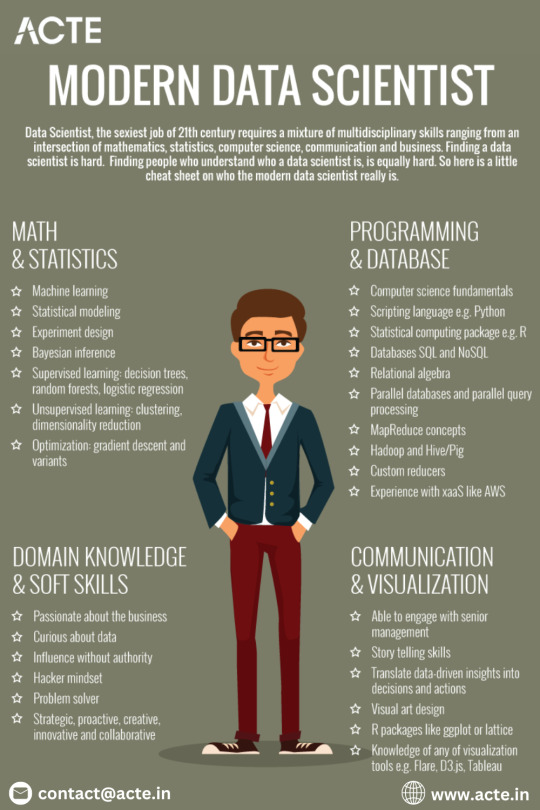
1. Educational Background: Building a Solid Foundation
A strong educational foundation is the bedrock of a successful data science career. Mastery of mathematics and statistics, encompassing algebra, calculus, probability, and descriptive statistics, lays the groundwork for advanced data analysis. While a bachelor's degree in computer science, engineering, mathematics, or statistics is advantageous, data science is a field that welcomes individuals with diverse educational backgrounds.
2. Programming Skills: The Language of Data
Proficiency in programming languages is a non-negotiable skill for data scientists. Python and R stand out as the languages of choice in the data science community. Online platforms provide interactive courses, making the learning process engaging and effective.
3. Data Manipulation and Analysis: Unraveling Insights
The ability to manipulate and analyze data is at the core of data science. Familiarity with data manipulation libraries, such as Pandas in Python, is indispensable. Understanding how to clean, preprocess, and derive insights from data is a fundamental skill.
4. Database Knowledge: Harnessing Data Sources
Basic knowledge of databases and SQL is beneficial. Data scientists often need to extract and manipulate data from databases, making this skill essential for effective data handling.
5. Machine Learning Fundamentals: Unlocking Predictive Power
A foundational understanding of machine learning concepts is key. Online courses and textbooks cover supervised and unsupervised learning, various algorithms, and methods for evaluating model performance.
6. Data Visualization: Communicating Insights Effectively
Proficiency in data visualization tools like Matplotlib, Seaborn, or Tableau is valuable. The ability to convey complex findings through visuals is crucial for effective communication in data science.
7. Domain Knowledge: Bridging Business and Data
Depending on the industry, having domain-specific knowledge is advantageous. This knowledge helps data scientists contextualize their findings and make informed decisions from a business perspective.
8. Critical Thinking and Problem-Solving: The Heart of Data Science
Data scientists are, at their core, problem solvers. Developing critical thinking skills is essential for approaching problems analytically and deriving meaningful insights from data.
9. Continuous Learning: Navigating the Dynamic Landscape
The field of data science is dynamic, with new tools and techniques emerging regularly. A commitment to continuous learning and staying updated on industry trends is vital for remaining relevant in this ever-evolving field.
10. Communication Skills: Bridging the Gap
Strong communication skills, both written and verbal, are imperative for data scientists. The ability to convey complex technical findings in a comprehensible manner is crucial, especially when presenting insights to non-technical stakeholders.
11. Networking and Community Engagement: A Supportive Ecosystem
Engaging with the data science community is a valuable aspect of the learning process. Attend meetups, participate in online forums, and connect with experienced practitioners to gain insights, support, and networking opportunities.
12. Hands-On Projects: Applying Theoretical Knowledge
Application of theoretical knowledge through hands-on projects is a cornerstone of mastering data science. Building a portfolio of projects showcases practical skills and provides tangible evidence of your capabilities to potential employers.
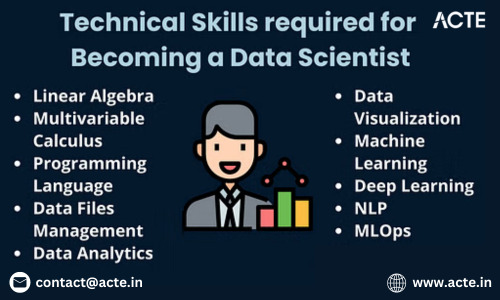
In conclusion, the journey in data science is unique for each individual. Tailor your learning path based on your strengths, interests, and career goals. Continuous practice, real-world application, and a passion for solving complex problems will pave the way to success in the dynamic and ever-evolving field of data science. Choosing the best Data Science Courses in Chennai is a crucial step in acquiring the necessary expertise for a successful career in the evolving landscape of data science.
3 notes
·
View notes
Text
Cracking the Code: Explore the World of Big Data Analytics
Welcome to the amazing world of Big Data Analytics! In this comprehensive course, we will delve into the key components and complexities of this rapidly growing field. So, strap in and get ready to embark on a journey that will equip you with the essential knowledge and skills to excel in the realm of Big Data Analytics.
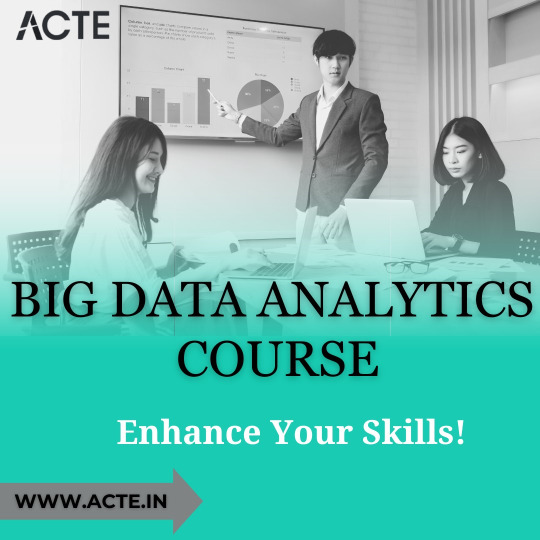
Key Components
Understanding Big Data
What is big data and why is it so significant in today's digital landscape?
Exploring the three dimensions of big data: volume, velocity, and variety.
Overview of the challenges and opportunities associated with managing and analyzing massive datasets.
Data Analytics Techniques
Introduction to various data analytics techniques, such as descriptive, predictive, and prescriptive analytics.
Unraveling the mysteries behind statistical analysis, data visualization, and pattern recognition.
Hands-on experience with popular analytics tools like Python, R, and SQL.
Machine Learning and Artificial Intelligence
Unleashing the potential of machine learning algorithms in extracting insights and making predictions from data.
Understanding the fundamentals of artificial intelligence and its role in automating data analytics processes.
Applications of machine learning and AI in real-world scenarios across various industries.

Reasons to Choose the Course
Comprehensive Curriculum
An in-depth curriculum designed to cover all facets of Big Data Analytics.
From the basics to advanced topics, we leave no stone unturned in building your expertise.
Practical exercises and real-world case studies to reinforce your learning experience.
Expert Instructors
Learn from industry experts who possess a wealth of experience in big data analytics.
Gain insights from their practical knowledge and benefit from their guidance and mentorship.
Industry-relevant examples and scenarios shared by the instructors to enhance your understanding.
Hands-on Approach
Dive into the world of big data analytics through hands-on exercises and projects.
Apply the concepts you learn to solve real-world data problems and gain invaluable practical skills.
Work with real datasets to get a taste of what it's like to be a professional in the field.
Placement Opportunities
Industry Demands and Prospects
Discover the ever-increasing demand for skilled big data professionals across industries.
Explore the vast range of career opportunities in data analytics, including data scientist, data engineer, and business intelligence analyst.
Understand how our comprehensive course can enhance your prospects of securing a job in this booming field.
Internship and Job Placement Assistance
By enrolling in our course, you gain access to internship and job placement assistance.
Benefit from our extensive network of industry connections to get your foot in the door.
Leverage our guidance and support in crafting a compelling resume and preparing for interviews.
Education and Duration
Mode of Learning
Choose between online, offline, or blended learning options to cater to your preferences and schedule.
Seamlessly access learning materials, lectures, and assignments through our user-friendly online platform.
Engage in interactive discussions and collaborations with instructors and fellow students.
Duration and Flexibility
Our course is designed to be flexible, allowing you to learn at your own pace.
Depending on your dedication and time commitment, you can complete the course in as little as six months.
Benefit from lifetime access to course materials and updates, ensuring your skills stay up-to-date.
By embarking on this comprehensive course at ACTE institute, you will unlock the door to the captivating world of Big Data Analytics. With a solid foundation in the key components, hands-on experience, and placement opportunities, you will be equipped to seize the vast career prospects that await you. So, take the leap and join us on this exciting journey as we unravel the mysteries and complexities of Big Data Analytics.
5 notes
·
View notes
Text
How Big Data is Transforming Decision Making in Global Businesses
In today’s digital world, data is everywhere — from your online shopping history to social media likes, and even your fitness tracker. But this isn’t just random information. For businesses around the world, it’s pure gold. Welcome to the age of Big Data — a game-changer in how global companies make smart, fast, and accurate decisions.
If you’re a student exploring tech and business, especially at one of the top BCA colleges in Bangalore, understanding how Big Data works is no longer optional — it’s essential.
📊 What is Big Data?
Big Data refers to extremely large sets of data that can’t be managed or processed using traditional tools. It’s not just about the size, but also about how fast it’s generated (velocity), the variety of its sources (like texts, images, videos, etc.), and the value it brings when analyzed correctly.
Companies collect data from many sources:
Customer interactions
Online transactions
Social media
Mobile apps
Sensors and IoT devices
But collecting data is only the first step. The real power lies in analyzing it to discover patterns, trends, and insights that drive smarter decisions.
🧠 How Big Data Improves Decision Making
Here’s how global businesses are using Big Data to transform their decision-making processes:
1. Better Customer Understanding
Big Data helps companies understand what customers want, when they want it, and how they behave. For example, Netflix uses data to suggest shows based on your viewing habits. This improves customer experience and loyalty.
2. Real-Time Decisions
Earlier, decisions were made using past reports. Now, with Big Data tools, companies can act instantly. Airlines, for instance, adjust pricing in real-time based on demand, weather, and competition.
3. Product Development
By analyzing customer feedback and usage data, companies can build better products. For example, smartphone brands collect data on how people use different features to improve future designs.
4. Risk Management
Banks use Big Data to detect fraud by spotting unusual activity. Insurance companies use it to assess risks more accurately. This means safer, smarter decisions with fewer losses.
5. Operational Efficiency
Big Data helps in reducing waste, improving supply chains, and predicting equipment failures before they happen — saving time and money.
🌍 Real-World Examples
Amazon uses Big Data to recommend products and optimize its huge supply chain.
Uber uses traffic and customer data to set prices and reduce waiting time.
Coca-Cola uses data from social media to understand public opinion and launch marketing campaigns.
These examples show how Big Data helps companies not just stay competitive — but lead the way.
🎓 Why Students Should Learn About Big Data
If you’re studying at one of the best BCA colleges in Bangalore, chances are you’ll encounter Big Data concepts in your coursework. That’s because Big Data is one of the fastest-growing areas in tech and business.
Here’s why it matters:
It opens up high-paying job opportunities like Data Analyst, Data Engineer, or Business Intelligence Specialist.
It builds logical thinking, problem-solving, and analytical skills.
It connects IT skills with real-world business applications.
Many top BCA colleges in Bangalore now include Big Data, machine learning, and analytics modules to prepare students for this growing field.
✅ How to Start Learning About Big Data
You don’t need to be an expert to start. Here are some easy steps:
Take introductory courses in data analytics or Python programming
Explore tools like Excel, Power BI, or Google Data Studio
Read blogs or watch YouTube videos on how businesses use data
Practice with small datasets available online
Over time, your skills will grow — and so will your confidence in understanding data-driven decisions.
🏁 Final Thoughts
Big Data is more than just a buzzword — it’s shaping the way the world works. From global brands to small startups, data is driving better, faster, and smarter decisions every day.
As a student aiming for a career in tech or business, especially from one of the top BCA colleges in Bangalore, learning about Big Data gives you a huge advantage. The earlier you start, the more future-ready you become.
So dive in, explore the data-driven world, and prepare to be part of the transformation!
0 notes
Text
From Chaos to Control: How Six Sigma is Powering Smart Manufacturing in 2025

🔧 Welcome to the Age of Intelligent Industry
Imagine walking into a manufacturing plant in 2025.
Robotic arms glide with surgical precision. Sensors blink in rhythm with every operation. Data pulses through the air like electricity. Machines "talk" to each other in code. AI predicts, prevents, and protects.
And yet… chaos lurks in the shadows.
One faulty process. One unnoticed variation. One data misinterpretation.
Boom. Downtime. Defects. Disruption.
Smart factories are only as smart as the minds that run them. And that’s where Lean Six Sigma becomes not just relevant but revolutionary.
🚀 The New Manufacturing Order Needs a New Breed of Professionals
2025 isn’t about more machines. It’s about smarter systems and smarter people.
From startups in Bangalore to global giants in Berlin, manufacturers are crying out for professionals who can:
Cut through noise and extract actionable insights
Optimize before they automate
Build sustainable processes that scale
Speak the language of both people and programs
This is exactly what Lean Six Sigma trains you to do, especially when you learn it the Gravitex Genesys way.
🧠 From Confusion to Clarity: The Power of Six Sigma in 2025
Here’s how Six Sigma is turning today’s factory chaos into tomorrow’s competitive edge:
🔍 1. AI + DMAIC = Supercharged Problem Solving
DMAIC, the heartbeat of Six Sigma, is now fueled by real-time data, AI algorithms, and machine learning models. It’s like giving X-ray vision to your process teams.
📊 2. IoT + Lean = Zero Waste, Maximum Value
Sensors and smart devices track everything. But Lean Six Sigma ensures that what you measure, you improve, eliminating waste, not just watching it.
🤖 3. Automation + Optimization = Intelligent Systems
In 2025, companies don’t automate chaos. They optimize first using Six Sigma tools like FMEA, SIPOC, and process mapping, then digitize perfection.
👨🏭 4. Smart Machines Still Need Smarter Humans
Tech can execute. Only people can innovate. Six Sigma empowers you to be that human: the bridge between algorithms and actual outcomes.
🏆 Why Gravitex Genesys is the Smartest Place to Learn Smart Six Sigma
Let’s be clear — not all Six Sigma certifications are created equal.
Gravitex Genesys is India’s top-rated institute because it blends legacy and future, analytics and action, concept and career.
What makes it stand out?
✨ Globally Recognized Certification 🧪 Real Projects from Smart Factories 👨🏫 Mentorship by Industry Masters 📈 Tools You’ll Actually Use: Minitab, Power BI, Python 🎯 Career Support to Launch You into 2025’s Smart Job Market
💡 Students, Professionals, Leaders – Listen Up
This isn’t just another skill. It’s a career catalyst, a promotion unlock, a startup supercharger, and a tech whisperer all rolled into one.
Whether you're:
A student dreaming of standing out
A manager tired of firefighting
A techie wanting to add strategic thinking
Or an entrepreneur building the factory of the future
Lean Six Sigma is the code to crack the chaos. And Gravitex Genesys is the place to master it.
🔥 Final Word: The Shift Is On
2025 is not waiting. Neither should you.
We’ve moved from manual to mechanical, from analog to digital and now from chaotic to controlled.
The new industry leaders won’t just know how machines work. They’ll know how systems thrive.
That leader can be you. Your journey starts with just one decision.
👉 Enroll in the Lean Six Sigma course at Gravitex Genesys and power the future of smart manufacturing.
Know More: https://www.gravitexgenesys.com/blog/six-sigma-smart-manufacturing
0 notes
Text
Masters in FinTech Courses in Ireland for International Students
Financial Technology also named FinTech represents a transformative sector which is disrupting financial markets throughout the world during our modern digital era. FinTech uses mobile banking combined with blockchain technology alongside robo-advisors to benefit from cryptocurrency to reshape our money-handling processes.
Ireland offers an attractive environment for international students who aim to study FinTech so they can access its rapidly growing job market. The combination of top financial technology and technological corporations together with internationally respected university institutions along with welcoming work visa regulations established Ireland as a preferred location for FinTech education.
The blog covers all essential information about studying FinTech Master's programs in Irish institutions together with their premier universities and subject design while discussing enrollment requirements as well as occupation paths and additional aspects.
Why Study FinTech in Ireland?
Study FinTech at Ireland because the country combines outstanding educational standards with innovative environments and economic safety. International students decide to study FinTech at postgraduate level in Ireland because of the following reasons:
1. Booming FinTech Sector
A developing FinTech environment has emerged at a rapid pace within Ireland. PayPal and Stripe together with Mastercard and Citi are among the global corporations that call Dublin their financial headquarters. Students benefit from studying in Ireland because the country maintains both well-established financial institutions together with thriving startup ventures.
2. Top-Quality Education
The FinTech programs in Irish universities and institutes combine accredited contents in finance alongside data analytics and blockchain alongside digital innovation. The curriculum incorporates real-world projects jointly with employer internships because it is carefully designed for current market needs.
3. Post-Study Work Opportunities
International Master's degree program graduates from Ireland can use the Third Level Graduate Scheme to stay for up to two years. Through the two-year stay-back visa program graduates have adequate time to search for employment in FinTech companies operating in Ireland.
4. English-Speaking Country
As an English-speaking nation in the EU, Ireland offers a comfortable environment for international students to study, live, and work without the language barrier.
5. Global Career Prospects
A FinTech degree from an Irish institution opens doors not only in Ireland but also across Europe, the UK, North America, and Asia, thanks to the global reputation of Irish education.
Top Universities Offering Masters in FinTech in Ireland
Several Irish universities and institutes of technology offer specialized Master’s programs in FinTech and related disciplines. Below are some of the top options:
1. University College Dublin (UCD) – MSc in Financial Data Science
Duration: 1 year (full-time)
Tuition Fee: ~€20,500
Highlights: Offered by UCD’s Smurfit Business School, this program blends data science with financial theory. It includes Python, machine learning, and predictive analytics.
2. Trinity College Dublin – MSc in Financial Risk Management
Duration: 1 year (full-time)
Tuition Fee: ~€20,500
Highlights: Though not purely FinTech, the course heavily integrates financial modeling, big data, and quantitative risk analytics.
3. University College Cork (UCC) – MSc in Finance (Investment and Asset Management)
Duration: 1 year
Tuition Fee: ~€18,000
Highlights: Combines core finance modules with FinTech-focused subjects like programming and analytics.
4. Dublin City University (DCU) – MSc in Financial Mathematics
Duration: 1 year
Tuition Fee: ~€17,000
Highlights: A quantitative-heavy course with a strong focus on programming, financial modeling, and machine learning applications in finance.
5. Technological University Dublin – MSc in FinTech
Duration: 1 year (full-time)
Tuition Fee: ~€14,500
Highlights: Designed specifically for FinTech professionals, this course offers hands-on training in blockchain, cybersecurity, and financial innovation.
6. National College of Ireland – MSc in FinTech
Duration: 1 year (full-time)
Tuition Fee: ~€15,000
Highlights: Offers a focused curriculum on modern financial technologies including AI in finance, regulatory tech (RegTech), and blockchain applications.
Course Structure and Curriculum
While course content varies across universities, a Master’s in FinTech in Ireland typically blends finance, technology, and data analytics. Below is a sample of key modules:
Core Modules:
Foundations of FinTech
Blockchain and Cryptocurrencies
Big Data Analytics in Finance
Financial Risk Analysis
Programming for Finance (Python/R/Java)
Cybersecurity and Data Protection
Machine Learning in Finance
Financial Markets and Instruments
Artificial Intelligence and Automation in Banking
Digital Payments and Financial Regulations (RegTech)
Additional Features:
Capstone Project or Dissertation
Industry Internships (depending on the university)
Guest lectures by FinTech industry experts
Hackathons and FinTech challenges
The interdisciplinary nature of the program ensures students gain both technical skills and financial knowledge, making them well-rounded professionals ready for the job market.
Eligibility Criteria for International Students
Academic Requirements:
A Bachelor’s degree in finance, economics, computer science, engineering, mathematics, or a related field.
Minimum academic score of 60% or equivalent GPA (varies by university).
English Language Requirements:
IELTS: Minimum 6.5 overall (with no band less than 6.0)
TOEFL iBT: 90+
PTE Academic: 63+
Other Requirements:
Statement of Purpose (SOP)
Updated CV/Resume
Letters of Recommendation (usually 2)
Passport copy and academic transcripts
Some programs may also require applicants to have prior knowledge or experience in coding, data analysis, or finance.
Living Expenses
Average monthly cost: €1,000 – €1,500 This includes accommodation, food, transport, health insurance, and miscellaneous expenses.
International students are advised to maintain a proof of funds of at least €10,000 for one year of living expenses, as part of the visa requirements.
Scholarships for International Students
There are several scholarships available to international students pursuing a FinTech Master’s in Ireland:
Government Scholarships:
Government of Ireland International Education Scholarships: Offers a €10,000 stipend and full tuition fee waiver.
University-Specific Scholarships:
UCD Global Scholarships
Trinity College Dublin Postgraduate Scholarships
National College of Ireland Scholarships
DCU International Merit Scholarships
Eligibility usually depends on academic merit, work experience, and extracurricular achievements.
Career Opportunities in FinTech After Graduation
A Master’s in FinTech opens doors to a wide range of career paths. Ireland's thriving financial and tech sectors mean graduates have excellent job prospects.
Job Roles:
FinTech Analyst
Financial Data Scientist
Blockchain Developer
Risk & Compliance Officer
Cybersecurity Analyst
Payment Solutions Manager
Quantitative Analyst
Product Manager (FinTech)
AI/ML Engineer in Finance
Business Intelligence Analyst
Top Employers in Ireland:
Stripe
Mastercard
Citi
Deloitte
PwC
Accenture
AIB (Allied Irish Banks)
KPMG
BNY Mellon
Revolut
Graduates can work in various industries, including banking, insurance, investment firms, consultancies, and FinTech startups.
Post-Study Work Visa in Ireland
One of the most attractive features for international students in Ireland is the Third Level Graduate Scheme, which allows:
Up to 2 years of post-study work stay for Master’s degree holders.
Graduates can work full-time (40 hours per week) during this period.
It serves as a stepping stone to secure long-term employment or apply for work permits.
Tips for International Students
Start Early: Begin your application process at least 8–10 months before the intake.
Customize Your SOP: Tailor your statement to highlight why you are interested in FinTech and your career goals.
Learn Basic Programming: Having basic knowledge of Python or R will give you a head start.
Stay Informed: Follow FinTech trends, join online communities, and attend virtual seminars.
Networking is Key: Make use of university career fairs, LinkedIn, and alumni networks to connect with potential employers.
Final Thoughts
Venture-based FinTech activities combined with outstanding educational institutions together with open employment pathways make Ireland the optimal destination for FinTech Master's degree programs. The program delivers essential interdisciplinary abilities to students from technology commerce and analytics backgrounds for their financial industry success in the future.
Professional expertise in FinTech will lead future financial sector development because the world is moving toward digital financial services along with blockchain technology and AI-powered banking solutions. Ireland establishes itself as the best starting point for this adventure.
Thinking of pursuing a FinTech Master’s in Ireland? At Cliftons Study Abroad, we offer personalized counseling, application support, visa guidance, and scholarship assistance to help you every step of the way.
Reach out to us today and start your global FinTech journey with confidence!
Are you looking for the best study abroad consultants in kochi
#study abroad#study in uk#study abroad consultants#study in australia#study in germany#study in ireland#study blog
0 notes
Text

Welcome to Pro Academys – Your Premier Destination to Learn Online Certified Course in Rajkot
At Pro Academys, we take immense pride in offering you the best platform to Learn Online Certified Course in Rajkot. As the leading institute in Rajkot, our goal is to empower learners with knowledge and skills in the most sought-after domains. Whether you're looking to upskill, enhance your career, or simply gain knowledge, Pro Academys is here to guide you every step of the way. Our courses in Data Science, Artificial Intelligence, Deep Learning, and many more, are designed to meet the needs of students and professionals alike.
#LearnOnline#CertifiedCourses#RajkotLearning#ProAcademys#DataScienceCourses#AICourses#OnlineLearningRajkot#SkillUpRajkot#ProfessionalCourses#RajkotEducation#CareerGrowth#DeepLearningRajkot#PythonProgramming
0 notes
Text
Latest in Tech and Programming.
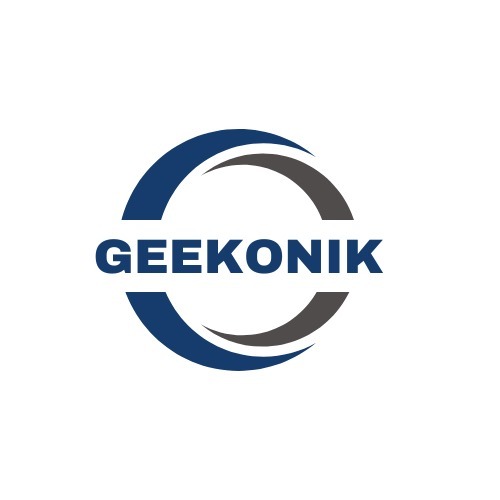
Who We Are
Welcome to Geekonik, your go-to platform for mastering the latest in tech and programming. Whether you’re a beginner eager to start your coding journey or an experienced developer looking to sharpen your skills, we offer a diverse range of expert-led courses designed to help you succeed in today’s ever-evolving tech industry.
Let the Numbers Speak
✅ 200+ Courses
✅ 30+ Expert Instructors
✅ 4000+ Students and Growing
Our Vision
At Geekonik, we believe learning tech should be both practical and enjoyable. That’s why our curriculum is constantly updated to reflect the latest trends, technologies, and best practices. Join us today and take the first step toward becoming a skilled programmer or tech professional!
Our Mission
Our mission is simple: to make technology and programming education accessible, engaging, and impactful for learners of all backgrounds. We are committed to equipping individuals with the skills and knowledge they need to thrive in the digital world.
Through hands-on projects, expert-led courses, and a collaborative learning environment, we inspire curiosity, foster growth, and empower the next generation of tech professionals. Our goal is to bridge the gap between learning and real-world application, ensuring our students are ready to tackle the challenges and opportunities of the future.
Success Stories
🚀 "Geekonik transformed my career! I went from zero coding experience to landing my first developer job in just six months. The hands-on projects made all the difference!" – Alex R., Software Engineer
Join the Geekonik community today and start building the future of tech—one skill at a time!
Call Us
+91 9560562455
Our Location
H140 Fourth Floor Sector 63 Noida
Website
##Who We Are#Welcome to Geekonik#your go-to platform for mastering the latest in tech and programming. Whether you’re a beginner eager to start your coding journey or an ex#we offer a diverse range of expert-led courses designed to help you succeed in today’s ever-evolving tech industry.#Let the Numbers Speak#✅ 200+ Courses#✅ 30+ Expert Instructors#✅ 4000+ Students and Growing#Our Vision#At Geekonik#we believe learning tech should be both practical and enjoyable. That’s why our curriculum is constantly updated to reflect the latest tren#technologies#and best practices. Join us today and take the first step toward becoming a skilled programmer or tech professional!#Our Mission#Our mission is simple: to make technology and programming education accessible#engaging#and impactful for learners of all backgrounds. We are committed to equipping individuals with the skills and knowledge they need to thrive#Through hands-on projects#expert-led courses#and a collaborative learning environment#we inspire curiosity#foster growth#and empower the next generation of tech professionals. Our goal is to bridge the gap between learning and real-world application#ensuring our students are ready to tackle the challenges and opportunities of the future.#Success Stories#🚀 “Geekonik transformed my career! I went from zero coding experience to landing my first developer job in just six months. The hands-on pr#Software Engineer#Join the Geekonik community today and start building the future of tech—one skill at a time!#Call Us
1 note
·
View note
Text
Entry-Level Data Analytics Role-Python Focus - Staff Level Profile
for all. Job Description – Entry-Level Data Analytics Role – Python Focus – Staff Level Profile Experience Level – Fresh Graduates… Welcome Responsibilities: Design and implement data analytics solutions primarily using Python, with exposure to Power BI. Participate… Apply Now
0 notes
Text
Is DevOps All About Coding? Exploring the Role of Programming and Essential Skills in DevOps
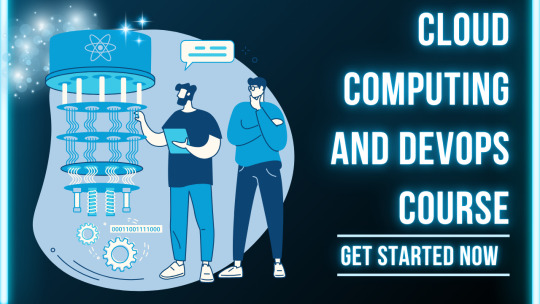
As technology continues to advance, DevOps has emerged as a key practice for modern software development and IT operations. A frequently asked question among those exploring this field is: "Is DevOps full of coding?" The answer isn’t black and white. While coding is undoubtedly an important part of DevOps, it’s only one piece of a much larger puzzle.
This article unpacks the role coding plays in DevOps, highlights the essential skills needed to succeed, and explains how DevOps professionals contribute to smoother software delivery. Additionally, we’ll introduce the Boston Institute of Analytics’ Best DevOps Training program, which equips learners with the knowledge and tools to excel in this dynamic field.
What Exactly is DevOps?
DevOps is a cultural and technical approach that bridges the gap between development (Dev) and operations (Ops) teams. Its main goal is to streamline the software delivery process by fostering collaboration, automating workflows, and enabling continuous integration and delivery (CI/CD). DevOps professionals focus on:
Enhancing communication between teams.
Automating repetitive tasks to improve efficiency.
Ensuring systems are scalable, secure, and reliable.
The Role of Coding in DevOps
1. Coding is Important, But Not Everything
While coding is a key component of DevOps, it’s not the sole focus. Here are some areas where coding is essential:
Automation: Writing scripts to automate processes like deployments, testing, and monitoring.
Infrastructure as Code (IaC): Using tools such as Terraform or AWS CloudFormation to manage infrastructure programmatically.
Custom Tool Development: Building tailored tools to address specific organizational needs.
2. Scripting Takes Center Stage
In DevOps, scripting often takes precedence over traditional software development. Popular scripting languages include:
Python: Ideal for automation, orchestration, and data processing tasks.
Bash: Widely used for shell scripting in Linux environments.
PowerShell: Commonly utilized for automating tasks in Windows ecosystems.
3. Mastering DevOps Tools
DevOps professionals frequently work with tools that minimize the need for extensive coding. These include:
CI/CD Platforms: Jenkins, GitLab CI/CD, and CircleCI.
Configuration Management Tools: Ansible, Chef, and Puppet.
Monitoring Tools: Grafana, Prometheus, and Nagios.
4. Collaboration is Key
DevOps isn’t just about writing code—it’s about fostering teamwork. DevOps engineers serve as a bridge between development and operations, ensuring workflows are efficient and aligned with business objectives. This requires strong communication and problem-solving skills in addition to technical expertise.
Skills You Need Beyond Coding
DevOps demands a wide range of skills that extend beyond programming. Key areas include:
1. System Administration
Understanding operating systems, networking, and server management is crucial. Proficiency in both Linux and Windows environments is a major asset.
2. Cloud Computing
As cloud platforms like AWS, Azure, and Google Cloud dominate the tech landscape, knowledge of cloud infrastructure is essential. This includes:
Managing virtual machines and containers.
Using cloud-native tools like Kubernetes and Docker.
Designing scalable and secure cloud solutions.
3. Automation and Orchestration
Automation lies at the heart of DevOps. Skills include:
Writing scripts to automate deployments and system configurations.
Utilizing orchestration tools to manage complex workflows efficiently.
4. Monitoring and Incident Response
Ensuring system reliability is a critical aspect of DevOps. This involves:
Setting up monitoring dashboards for real-time insights.
Responding to incidents swiftly to minimize downtime.
Analyzing logs and metrics to identify and resolve root causes.
Is DevOps Right for You?
DevOps is a versatile field that welcomes professionals from various backgrounds, including:
Developers: Looking to expand their skill set into operations and automation.
System Administrators: Interested in learning coding and modern practices like IaC.
IT Professionals: Seeking to enhance their expertise in cloud computing and automation.
Even if you don’t have extensive coding experience, there are pathways into DevOps. With the right training and a willingness to learn, you can build a rewarding career in this field.
Boston Institute of Analytics: Your Path to DevOps Excellence
The Boston Institute of Analytics (BIA) offers a comprehensive DevOps training program designed to help professionals at all levels succeed. Their curriculum covers everything from foundational concepts to advanced techniques, making it one of the best DevOps training programs available.
What Sets BIA’s DevOps Training Apart?
Hands-On Experience:
Work with industry-standard tools like Docker, Kubernetes, Jenkins, and AWS.
Gain practical knowledge through real-world projects.
Expert Instructors:
Learn from seasoned professionals with extensive industry experience.
Comprehensive Curriculum:
Dive deep into topics like CI/CD, IaC, cloud computing, and monitoring.
Develop both technical and soft skills essential for DevOps roles.
Career Support:
Benefit from personalized resume reviews, interview preparation, and job placement assistance.
By enrolling in BIA’s Best DevOps Training, you’ll gain the skills and confidence to excel in this ever-evolving field.
Final Thoughts
So, is DevOps full of coding? While coding plays an important role in DevOps, it’s far from the whole picture. DevOps is about collaboration, automation, and ensuring reliable software delivery. Coding is just one of the many skills you’ll need to succeed in this field.
If you’re inspired to start a career in DevOps, the Boston Institute of Analytics is here to guide you. Their training program provides everything you need to thrive in this exciting domain. Take the first step today and unlock your potential in the world of DevOps!
#cloud training institute#best devops training#Cloud Computing Course#cloud computing#devops#devops course
0 notes
Text
Linear Regression: Simplifying Predictions with Data
Unlock the secrets of Linear Regression to boost your predictive analytics skills. Dive into our latest blog for actionable insights. #DataScience
Welcome to our detailed exploration of Linear Regression, a fundamental statistical method used in predicting outcomes based on data relationships. In this post, we’ll dive into what it is, its importance in data analysis, and how you can implement it using Python’s scikit-learn library. Whether you’re managing a business, studying for exams, or just curious about data science, mastering this one…
0 notes